Video: Happy new year from the rail companies -your fare’s gone up and your train’s cancelled
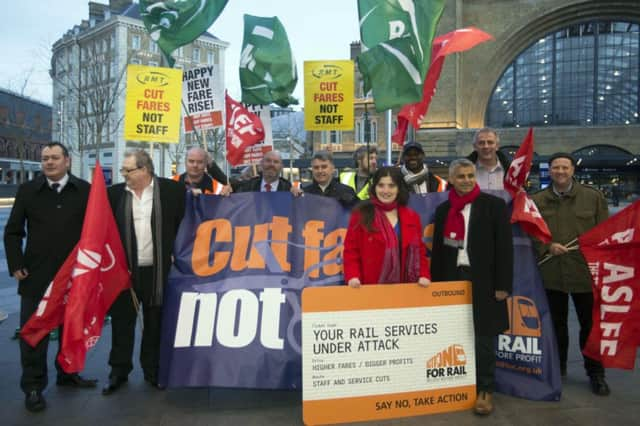

The hold-ups were caused by overhead wire problems at Nuneaton in the West Midlands.
London Midland trains between London and Crewe were delayed as were Virgin’s Trent Valley services.
Advertisement
Hide AdAdvertisement
Hide AdServices on Merseyrail were disrupted during the rush hour, while a Northern Rail Selby to Huddersfield service had to start from Leeds due to a train fault.
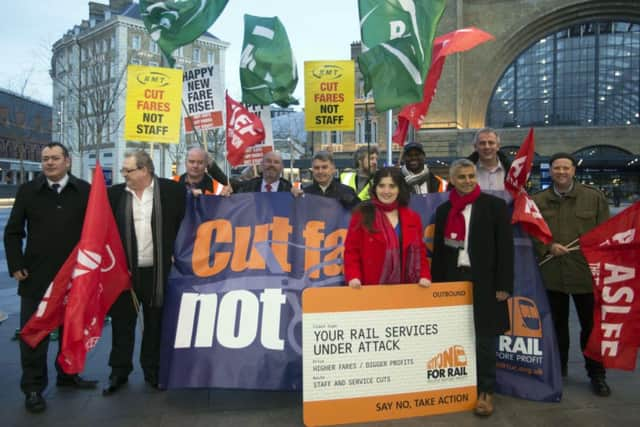

Passengers at Menston station in West Yorkshire were greeted by handwritten notices warning that staff would be “too busy” to issue new season tickets on Monday.
Train trouble on the day fares rose even extended to the major station being used by Transport Secretary Patrick McLoughlin today to extol the Government’s record-high investment in the railways.
Early in the morning, as commuters took in the fact that their season tickets were going up by up to 2.5%, Mr McLoughlin was at Birmingham New Street station.
Advertisement
Hide AdAdvertisement
Hide AdWhile there he said that between 2014 and 2019, the Government was investing £38.5 billion through Network Rail to improve railway infrastructure.
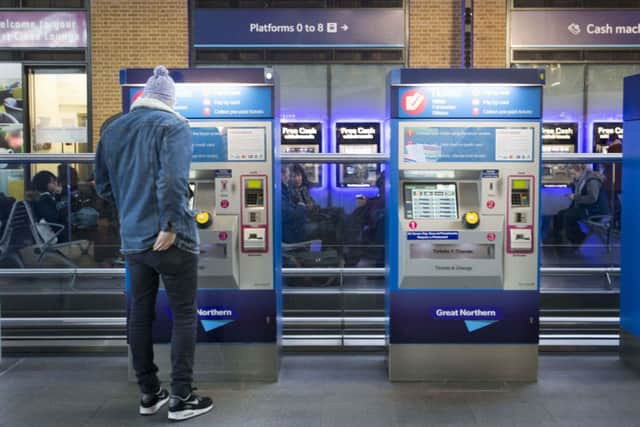

By mid-morning, Birmingham New Street was being plagued by a nearby signalling problem with delays of up to an hour to services through the station.
It was one of a number of hold-ups for passengers on the first day of the new fares. There was early-morning trouble in East Anglia, then difficulties on Merseyrail services and on routes in the West Midlands.
Flooding meant buses had to replace trains between Blaenau Ffestiniog and Llandudno Junction in Wales, while there were delays between Sandhills and Southport/Kirkby/Ormskirk in north-west England.
Advertisement
Hide AdAdvertisement
Hide AdAn obstruction on the line between Sheffield and Chesterfield caused hold-ups between Sheffield and Derby/Nottingham.
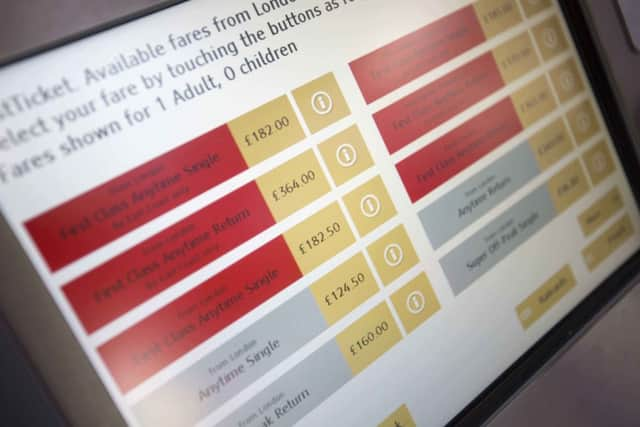

While season tickets are rising by up to 2.5%, the overall average rise for all fares is 2.2%.
The rises follow weeks of disruption to rush-hour services with problems for passengers compounded by over-running festive engineering work.
The over-run last Saturday led to chaotic scenes, with King’s Cross and Paddington stations in London having to be closed and also resulted, eventually, in Network Rail chief executive Mark Carne announcing he would not be taking his annual performance-related bonus.
Advertisement
Hide AdAdvertisement
Hide AdCommuters were considerably underwhelmed by the rail fare rise today. Lorna Tullis, 35, a manager, from Gillingham in Kent, who uses Southeastern high-speed Javelin trains to travel to London said the rise was “disgusting and appalling”.
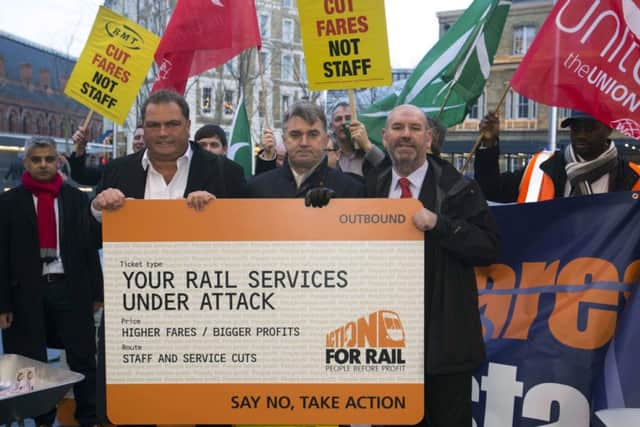

Australia-born commuter Will Prino, 48, said his Hitchin-London season ticket cost about £450 a month. “The price is really terrible. I pay in a month what you would pay in a year in Australia,” he added.
Mr McLoughlin said: “I accept 2.5% is more than a passenger wants to pay. Any increase is to be regrettable.
“But it is the fact we’re investing record amounts in to the industry so we can get better train services and a better rail service for the UK.”
Advertisement
Hide AdAdvertisement
Hide AdSpeaking in Halifax, Prime MInister David Cameron said: “We’ve made sure that rail fares cannot go up by more than inflation.
“So the rail fare increase this year, as last year, is linked to inflation, and I think that’s right.
“In previous years it’s gone up by more than inflation. But, of course, what you’re seeing on our railways is a £38 billion investment project.
“And that money is coming, of course, from taxpayers, from the Government, and from fare payers as well.”
Advertisement
Hide AdAdvertisement
Hide AdHe said Britain was seeing “the biggest investment in our roads since the 1970s, but in our railways since Victorian times”.
Mr Cameron went on: “And it’s very important that we continue that investment because it’s an absolutely key part to our long-term economic plan, which is about staying on the road to a stronger economy which you can only have if you have the infrastructure that a stronger economy needs.”
Shadow transport secretary Michael Dugher said it was train operating companies which had to take a greater burden, not passengers or taxpayers.
He said: “In my view, if someone has to get their hand in their pocket, it’s got to be the operating companies - they are making decent profits still.”
Advertisement
Hide AdAdvertisement
Hide AdGreen Party MP Caroline Lucas, who will join passengers at Brighton station on Monday to call for Britain’s railways to be returned to public hands, said services over the Christmas period were typical of “a system that has flatly failed”.
In a demonstration at King’s Cross station today TUC members handed out protest leaflets to commuters. Mick Cash, general secretary of the RMT transport union spoke of “the scandal of Britain’s great rail fares rip-off”, while TSSA transport union leader Manuel Cortes said British rail travellers paid the highest fares in the UK.
Unions and transport campaigners have pointed out that some fares have risen by more than 20% since January 2010, with wage increases failing to match fare increases.
Michael Roberts, director general of the Rail Delivery Group representing rail operators and Network Rail, said: “At 2.2%, the average increase in fares in 2015 is the lowest for five years.
Advertisement
Hide AdAdvertisement
Hide Ad“We understand no one likes to pay more, especially to go to work. For every £1 spent on fares, 97p goes on track, train, staff and other costs while 3p goes in profits earned by train companies for running services on Europe’s fastest-growing railway.”